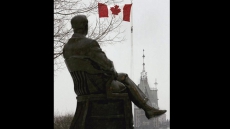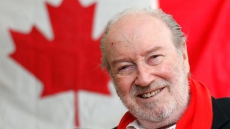OTTAWA — Sections of the federal government's anti-terrorism and money laundering financing law are unconstitutional because they violate solicitor-client privilege, the Supreme Court of Canada declared Friday.
In a 7-0 ruling , the court carved out an exemption for lawyers from the federal government's 2000 law that targets money laundering and terrorist financing. The law still applies to other professions, such as financial institutions and accountants.
The court upheld lower court victories by the Federation of Law Societies of Canada that had suspended the implementation of these provisions on lawyers pending the outcome of this case.
The government had wanted lawyers to be subject to provisions of the Financial Transactions and Reports Analysis Centre of Canada, or Fintrac.
The regulations would have compelled lawyers to keep track of their clients' financial transactions and subjected lawyers' offices to searches without warrants.
The Supreme Court said that violated lawyers' charter rights to be protected from unlawful search and seizure and the undue deprivation of their liberty.
"The regime authorizes sweeping law office searches which inherently risk breaching solicitor-client privilege," Justice Thomas Cromwell wrote for the court. "It does so in a criminal law setting and for criminal law purposes."
Cromwell said that the law, as originally written, required lawyers "on pain of imprisonment, to obtain and retain information that is not necessary for ethical legal representation and provide inadequate protection for the client's confidences subject to solicitor-client privilege."
Fred Headon, past president of the Canadian Bar Association, said the ruling won't allow criminals or terrorists to hide behind lawyers.
"Lawyers have very clear obligations towards their law societies who regulate what we do — give us our licence to practise — that we are not to be using our offices, our duties, for unlawful purposes," he said.
"If lawyers were involved in criminal activity, well they would have to deal with the Criminal Code like anybody else."
Thomas Conway, president of the Federation of Law Societies, said the ruling allows Canadians to have confidence in their lawyers because it keeps them from becoming "agents of the state."
He said the societies' codes of conduct have safeguards to protect lawyers from being "used as dupes or unwittingly participate in money laundering or terrorism activities."
The law imposed a maximum five-year prison term and-or a fine of up $500,000 for not complying.
Five of the seven justices also enshrined in the Constitution an established legal principle that lawyers have a "duty of commitment to their clients' cause."
"Clients — and the broader public — must justifiably feel confident that lawyers are committed to serving their clients' legitimate interests free of other obligations that might interfere with that duty," said Cromwell.
"Otherwise, the lawyer's ability to do so may be compromised and the trust and confidence necessary for the solicitor-client relationship may be undermined," he added.
"I conclude that there is overwhelming evidence of a strong and widespread consensus concerning the fundamental importance in democratic states of protection against state interference with the lawyer's commitment to his or her client's cause."
Chief Justice Beverley McLachlin and Justice Michael Moldaver dissented on supporting that principle, saying charter protections were already in place to protect solicitor-client privilege.





